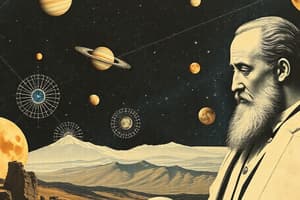Podcast
Questions and Answers
What celestial bodies did Galileo discover using a telescope?
What celestial bodies did Galileo discover using a telescope?
The moon's craters and mountains, the phases of Venus, and four moons of Jupiter (Galilean satellites)
What academic field did Galileo switch to due to financial constraints?
What academic field did Galileo switch to due to financial constraints?
Mathematics
What theory did Galileo support about the solar system?
What theory did Galileo support about the solar system?
Copernicus's theory of the sun being the center of the solar system
What inventions are attributed to Galileo?
What inventions are attributed to Galileo?
What consequence did Galileo face for supporting Copernicus's ideas?
What consequence did Galileo face for supporting Copernicus's ideas?
Study Notes
- Galileo Galilei, born in 1564 in Pisa, Italy, was the first person to use a telescope to study the stars and discovered that the moon had craters and mountains.
- He initially studied medicine at the University of Pisa but switched to mathematics due to financial constraints, eventually becoming known for his work on forces of motion.
- Galileo's observations with a telescope led to the discovery of the phases of Venus, four moons of Jupiter (now known as the Galilean satellites), and he supported Copernicus's theory of the sun being the center of the solar system.
- His discoveries, including Saturn's rings, the planet Neptune, and sunspots, led to conflicts with the Roman Catholic Church, which led to his house arrest for supporting Copernicus's ideas.
- Despite facing persecution, Galileo continued his work, invented the thermometer and pendulum clock, and is regarded as the father of modern science for his contributions.
Studying That Suits You
Use AI to generate personalized quizzes and flashcards to suit your learning preferences.
Description
Explore the life and achievements of Galileo Galilei, the Italian scientist known for his groundbreaking discoveries in astronomy and physics. Learn about his contributions to the field of modern science despite facing opposition from the Roman Catholic Church.




